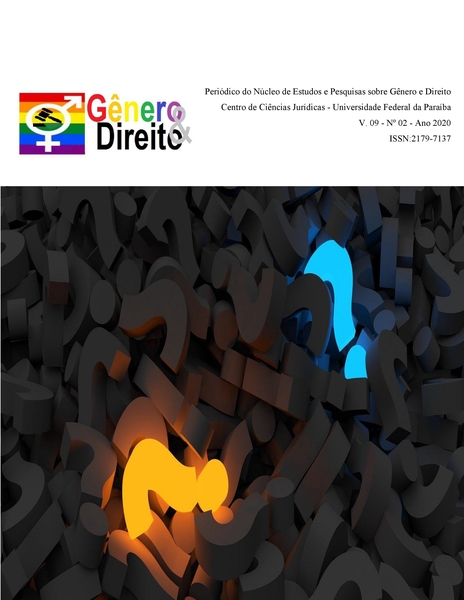PSYCHOLOGIST’S WORK ON THE IDENTIFICATION OF EMOTIONAL DISTURBANCE AMONG ADOLESCENTS
DOI:
https://doi.org/10.22478/ufpb.2179-7137.2020v9n2.50819Palavras-chave:
Aggressive behavior, correction, metaphorical maps, adolescents, fears, anxietyResumo
This article studies the peculiar properties of the emotional sphere of adolescents, reveals aggression, fears, anxiety, family education types that have an impact on the formation of emotional imbalance and disadaptation among the respondents, it also presents the results of the integrated program for the individual development, taking into consideration the health-saving factor that implements modern and innovative trends required in the work of the psychological service of an educational institution, and provides the justification of the importance and necessity of using associative metaphorical maps in work with adolescents and parents, as an innovative tool for more efficient work with a specific case. We have analyzed family relationships, behavior motives, parental position, parenting styles in order to draw up a special correctional program. The correctional work has been conducted with the parallel work of the adolescent group, parent seminar and parent group classes, as well as applying the method of cooperative interaction between the children and parents. The author’s projective methodology “The Way to the Sun” proposed in the study, and aimed at diagnosing the adolescent’s emotional sphere (anxiety, aggression fears), family relationships, have demonstrated their suitability and efficiency of work not only with adolescents but also with their parents, allowing us to work with emotions and feelings squeezed into the subconscious.Moreover, during the research, a model of psychological and pedagogical impact on students was developed with the purpose of regulation of their emotional sphere, the structural components of which included the following: organizational, research, cognitive and practical components. A comparative analysis of the availability of psychological problems among students, an integrated approach to the mental health of children and adolescents formed the basis of the pilot project “School of the Future” developed by us, which involves the implementation of a focal point in the education system in order to provide the social and psychological support to the school, combining four services: psychological, valeological, social educator service and school mediation service. Thus, the experimental research presented in this article has demonstrated the effectiveness of correctional and preventive programs, the efficiency of which has been tested applying methods of mathematical statistics and improving all of the above indicators.
Downloads
Referências
Amiraslanova S.F. (2000) "Difficult" children and the psychological characteristics of the work done with them. Baku.
Azimov Q.E. (1990). Psychology of the schoolboy. Baku
Bozhovich L. I.(1976). Psychological features of development of the personality of the teenager. M.: "Knowledge".
Vasilkova Yu. V. To Be a man. Be a woman. Gender identity training for teenagers. (2010) SPb.: Speech.
Age and individual characteristics of younger adolescents (1967) / ed. D. B. Elkonin, T. V. Dragunova. Moscow.
Vygotsky L. S. Works: in 6 T. T. 4. (1984)/ Child psychology / ed. D. B. Elkonin. Moscow.
Jean Piaget: theory, experiments, discussions (2001) /SB. art / ed. by L. F. Obukhova, year General. Moscow.
Kadyrova R. G. (2007) National identity of Azerbaijani children and adolescents: social and psychological analysis. Baku: the Caucasus.
Craig G., Bokum D. (2005). Developmental Psychology. SPb.: Peter
Levin K. (2019) Field Theory in the social Sciences. Moscow. Academic project.
Leontiev A. N. (1975). Activity. Consciousness. Personality. Moscow
Ovcharova R. V. (2003). Practical psychology of education. M.: publishing center "Academy".
Petrovsky V. A. (1984)/ To construction of model of development of the personality in transitional age. Moscow: APN USSR.
Posysoev N.N. (2004) Grundlagen der Familienpsychologie und Familienberatung. Moscow.
Rice Dolgin K. F. (2012). Psychology of adolescence and youth. 12th ed. Peter
Surkova L. Child from 8 to 13. The most difficult period M.: AST, 2015, 192 p.
Fedorenko L. G. (2017). Positive (projecting) psychology at school. Moscow
Freud A. (1999). Collected works: in 2 vols. Moscow: Eksmo-press.
Freud Z. Introduction to psychoanalysis (2015). St. Petersburg.
Stern V. (1926) Giftedness of children and adolescents and methods of its research. Kharkov.
Eric Erickson (2019). Childhood and society. Peter.
The Course of Human Life: A Study of Goals in the Humanistic Perspective/ ed. by C.Buhler, F.Massarik. N.Y., 1968

